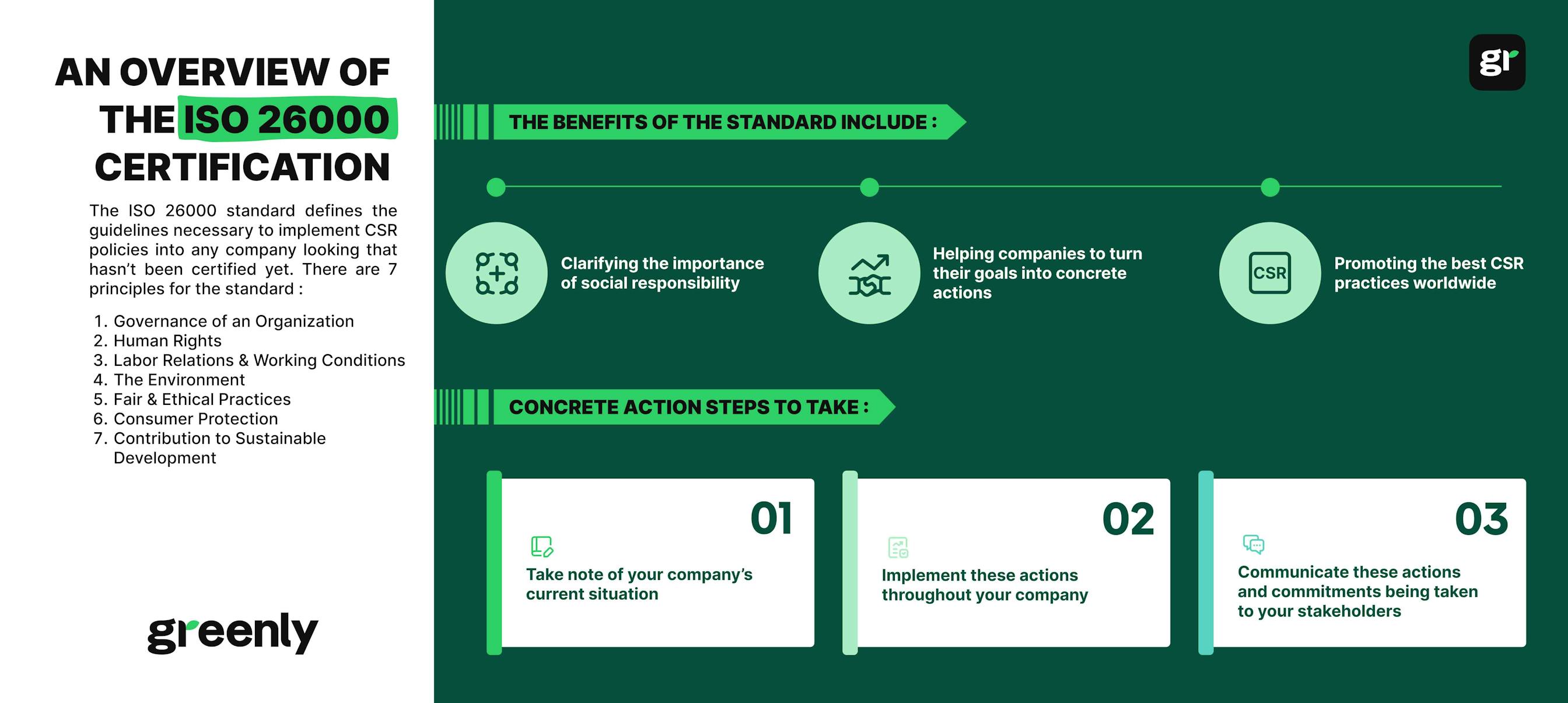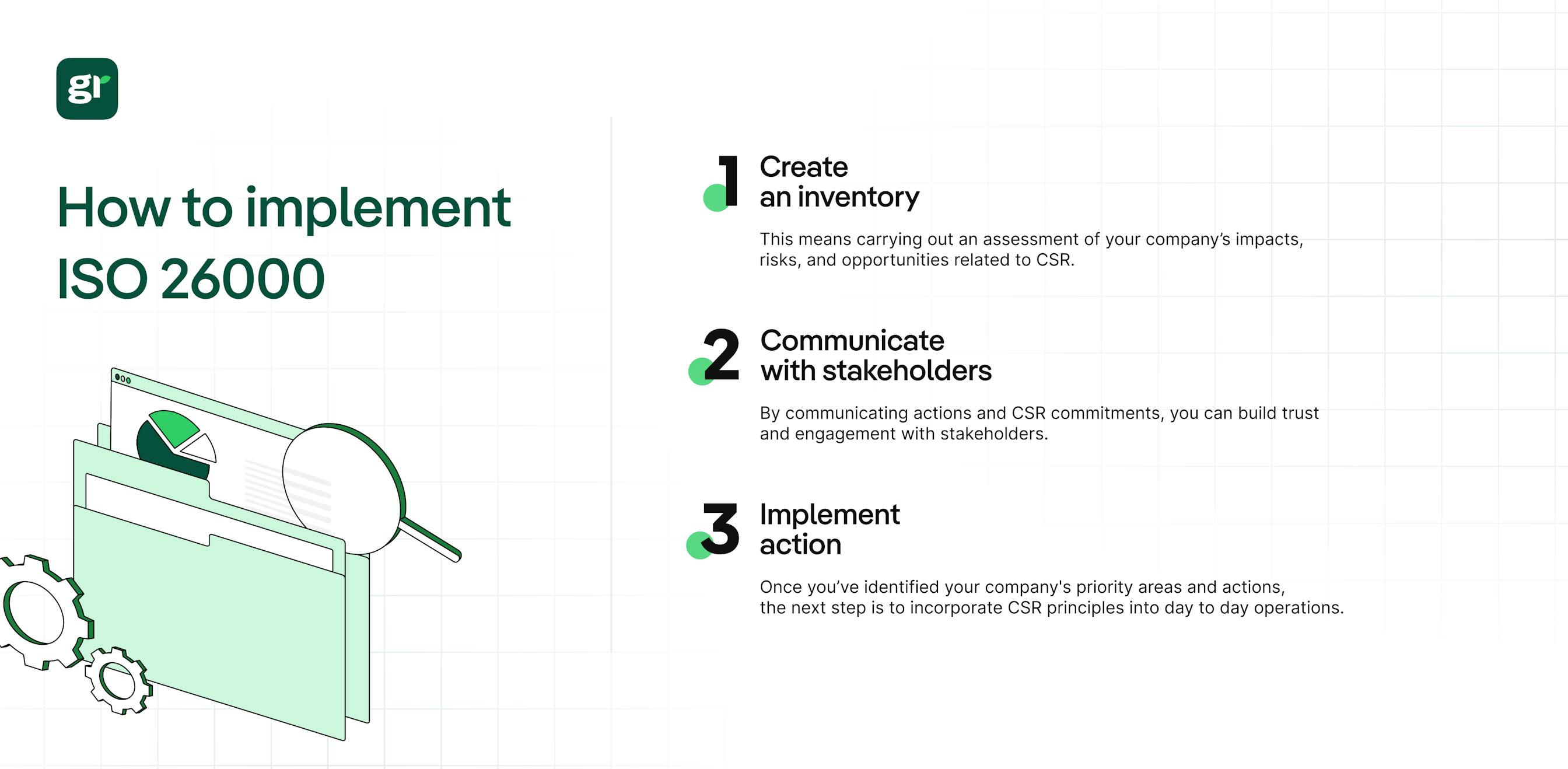
What are the 3 Pillars of Corporate Sustainability?
In this article, we'll explore what the 3 pillars of corporate responsibility are, why they're important, and how businesses can turn them into practical action.
ESG / CSR
Industries



ISO 26000 serves as an international standard designed to assist organizations in effectively evaluating and addressing their social responsibilities. It helps them identify and prioritize what is relevant and significant to their mission, vision, operations, and processes. Additionally, it encourages them to consider the impact of their actions on customers, employees, communities, stakeholders, and the environment.
👉 In this article we’ll explore what ISO 26000 is, and how companies can implement an effective CSR strategy that aligns with the standard.
ISO 26000 is a standard developed by the International Organization for Standardisation (ISO), which provides guidance on social responsibility. Unlike other ISO standards, it is not certifiable but serves as a voluntary framework to help organizations effectively implement social responsibility principles. Launched in 2010, ISO 26000 offers a global resource for best practices in social responsibility, applicable to organizations of any size, activity, or location.
The development of ISO 26000 was a comprehensive process involving five years of extensive negotiations with stakeholders worldwide, including government representatives, NGOs, industry experts, consumer groups, and labor organizations. This collaborative effort ensured that the standard reflects an international consensus, integrating diverse perspectives and expertise.
In the context of companies, social responsibility (also referred to as Corporate Social Responsibility or CSR) is the commitment of businesses to contribute positively to society while managing their operations ethically and sustainably.
It encompasses a range of practices that aim to have a beneficial impact on various stakeholders, including employees, customers, communities, and the environment. This involves adopting fair labor practices, reducing environmental footprints, engaging in philanthropy, ensuring ethical sourcing, promoting transparency, and respecting stakeholder interests. By integrating social responsibility into their business strategies, companies can enhance their reputation, foster customer loyalty, and contribute to long-term societal well-being.
The International Organization for Standardization (ISO) is an independent, non-governmental international organization that develops and publishes standards to ensure the quality, safety, efficiency, and interoperability of products, services, and systems. Founded in 1947, ISO brings together experts from various industries to create consensus-based standards that facilitate global trade, innovation, and technological development. With over 23,000 standards covering diverse sectors, ISO plays a crucial role in enhancing product quality, promoting safety, and fostering international collaboration.
| ISO Standard | Description | More Information |
|---|---|---|
| ISO 20400 | Guidance on sustainable procurement, ensuring organizations make purchasing decisions that benefit society and the environment. | Learn more |
| ISO 14004 | Environmental management systems - General guidelines on principles, systems, and support techniques. | Learn more |
| ISO 14001 | Environmental management systems - Requirements with guidance for use. | Learn more |
| ISO 14067 | Greenhouse gases - Carbon footprint of products - Requirements and guidelines for quantification. | Learn more |
| ISO 14044 | Environmental management - Life cycle assessment - Requirements and guidelines. | Learn more |
| ISO 50001 | Energy management systems - Requirements with guidance for use. | Learn more |
| ISO 9001 | Quality management systems - Requirements for organizations to consistently provide products and services that meet customer and regulatory requirements. | Learn more |
The ISO 26000 standard encompasses seven core principles that serve as a foundation for companies to develop their action plans. Each of the seven core subjects addresses various strategies for action, providing guidance for responsible and sustainable practices:
👉 The ISO 26000 standard provides a roadmap for each of these seven principles, enabling companies to conduct self-assessments and identify areas for improvement. These guidelines are applicable to various fields and cover the entire scope of an organization's operations, ensuring a comprehensive approach to social responsibility.


As we’ve already discussed, implementing ISO 26000 does not involve certification or lead to certification. Unlike other well-known ISO standards, ISO 26000 is not designed for certification purposes. Instead, it provides guidelines to assist organizations in understanding and implementing social responsibility principles effectively.
👉 It is important to note that ISO 26000 is not a management system but rather an approach that can be evaluated by independent bodies. Organizations can consider other certification options and labels to demonstrate their commitment to CSR. For example, in the UK, the BS 8900 certification provides a framework for integrating sustainable development into business practices. It encompasses economic, social, and environmental aspects, enabling organizations to effectively manage their sustainability performance.
Assessments such as this can provide an evaluation or score based on the organization's implementation of the ISO 26000 standard. However, it is essential to emphasize that ISO 26000 evaluations do not result in certification.
👉 To find out more about implementing a CSR approach in your company, why not read our article.

The ISO 26000 standard and the CSR approach are closely interconnected. ISO 26000 plays a crucial role in assisting companies in planning, implementing, and evaluating the effectiveness of CSR practices.
The guidelines provided by ISO 26000 make a significant contribution to embracing sustainable development (SD), which entails an economic growth approach that considers long-term perspectives and integrates ecological and social considerations.
The concept of sustainable development, encompassing economic, social, and environmental aspects, aligns closely with the themes covered by ISO 26000. As a result, the implementation of the ISO 26000 standard can have a positive impact on various areas, leading to improved company performance.
By adopting sustainable marketing and CSR practices in line with ISO 26000, organizations can expect to benefit from:
While ISO 26000 does not provide certification, external agents can evaluate a company’s CSR approach and assign a score based on the seven core principles of ISO 26000. This evaluation offers a reliable and comprehensive method for assessing your company's CSR policy.
To enhance the credibility of your CSR approach, you can also conduct a self-assessment using the ISO 26000 criteria. Through an ISO 26000 assessment, you can gain valuable insights, including:
By leveraging ISO 26000 assessments, you can obtain an objective evaluation of your CSR efforts, identify areas for enhancement, and benchmark your performance against industry peers. This process enables you to align your CSR practices with international standards and demonstrate your commitment to sustainable and responsible business practices.

The experts at ISO have created several documents to help organizations implement the ISO 26000 standard. These resources include:
These valuable resources, along with other materials, are readily available on the ISO website. They provide organizations with comprehensive information and guidance to support their understanding and implementation of the ISO 26000 standard.

One of the core principles of ISO 26000 is Environmental Responsibility. This principle highlights the importance of environmental stewardship and encourages organizations to prioritize actions that promote sustainability, including a reduction of greenhouse gas (GHG) emissions.
Organizations are encouraged to measure, monitor, and reduce their greenhouse gas emissions. This involves measuring emissions, setting targets, and adopting carbon footprint reduction strategies.
This is why conducting a carbon assessment for your company is an essential initial step towards implementing a robust CSR approach aligned with the principles of ISO 26000. A carbon assessment will allow you to understand and quantify your company's carbon footprint, identifying areas where emissions can be reduced and sustainability practices can be enhanced.
By conducting a carbon assessment, you can gain valuable insights into your company's environmental impact, paving the way for informed decision-making and targeted actions to reduce greenhouse gas emissions. It demonstrates a company’s commitment to environmental responsibility and aligns with the Environmental Responsibility principle of ISO 26000.
👉 Initiate a carbon assessment for your company with Greenly, a specialized carbon accounting company. Our expertise and solutions streamline the process, allowing you to measure and understand your carbon footprint accurately. Take action now to demonstrate sustainability commitment and contribute to a greener future.


Implementing ISO 26000 involves detailed and structured steps to ensure the effective integration of socially responsible behavior at the corporate level:
By following these detailed steps, organizations can effectively implement ISO 26000, making a substantial positive impact on their operations and stakeholder relationships.
Reminder: Unlike sector-specific standards, such as the Global Reporting Initiative (GRI), the ISO 26000 standard is applicable to organizations of all sizes, from start-ups to large corporations, no matter where they are in the world.

ISO 26000 incorporates various documents from renowned international organisations such as the UN, ILO, UNEP, UN Global Compact, European Union, and OECD, among others, which provide valuable insights on CSR topics. To access the standard detailing the "Guidance on social responsibility," you can obtain the PDF format of the document on the ISO website, here.

While ISO 26000 is an important standard related to sustainable development (SD) and corporate social responsibility (CSR), it is not the sole standard addressing these issues.
Sustainable development encompasses three core principles: environment, social, and quality. For each of these aspects, there are specific international standards in place:
These standards provide organizations with guidance and frameworks to address environmental, social, and quality aspects of their operations. They complement the ISO 26000 standard by providing more specific requirements and guidelines in these particular areas.
By considering these standards collectively, organizations can develop comprehensive approaches to sustainable development, corporate social responsibility, and quality management, aligning their practices with recognized international benchmarks.
Greenly offers comprehensive carbon management services to assist with the environmental aspects of ISO 26000. Here's how Greenly can support your journey:
Start your climate journey:
Measure accurately:
Monitor with ease:
Decarbonise your supply chain:
Unveil product impact with Greenly's Life Cycle Assessment (LCA):
By leveraging Greenly’s expertise and advanced tools, you can effectively manage and reduce your carbon footprint, aligning with ISO 26000’s social responsibility principles. Get in touch with us today!
